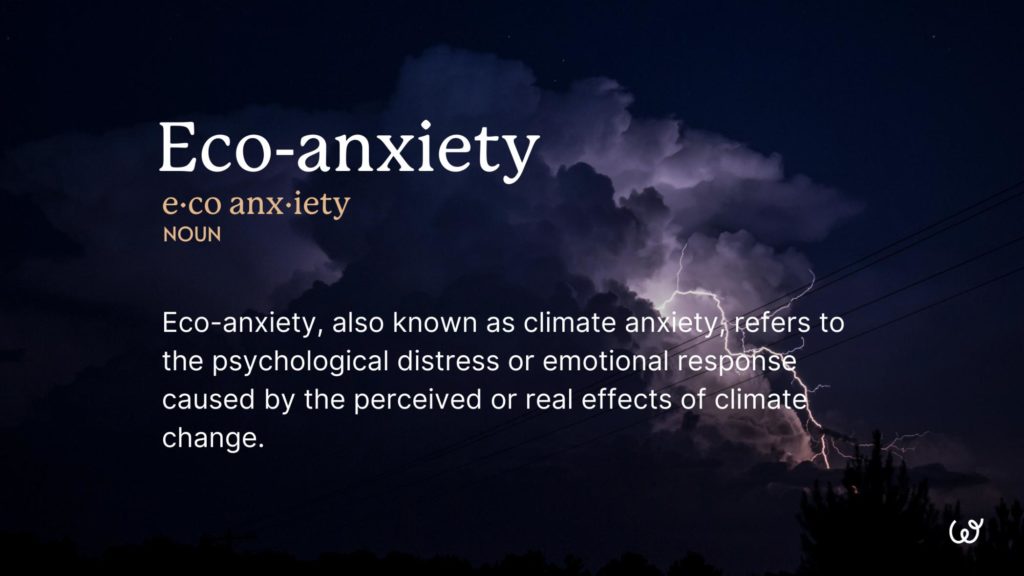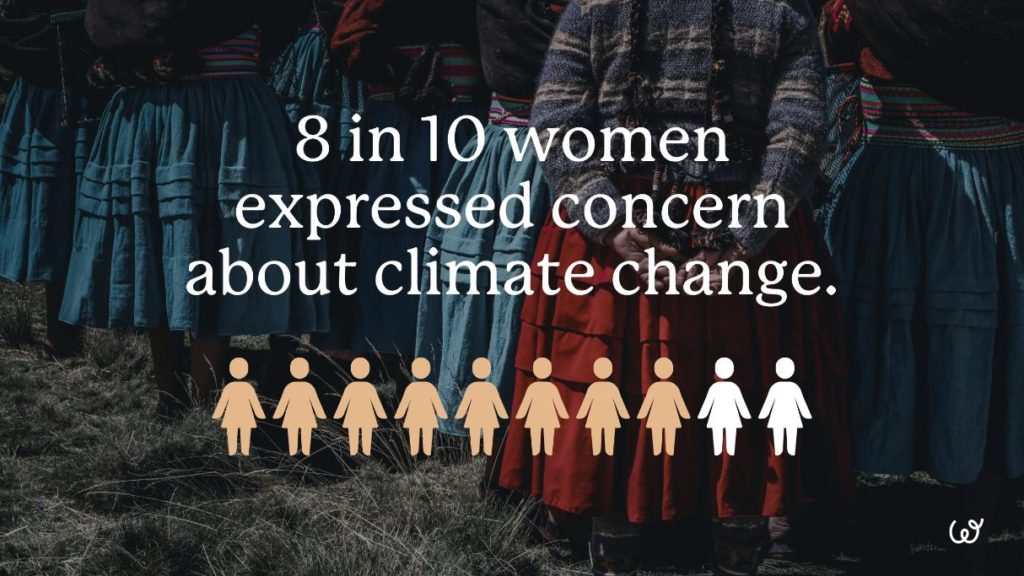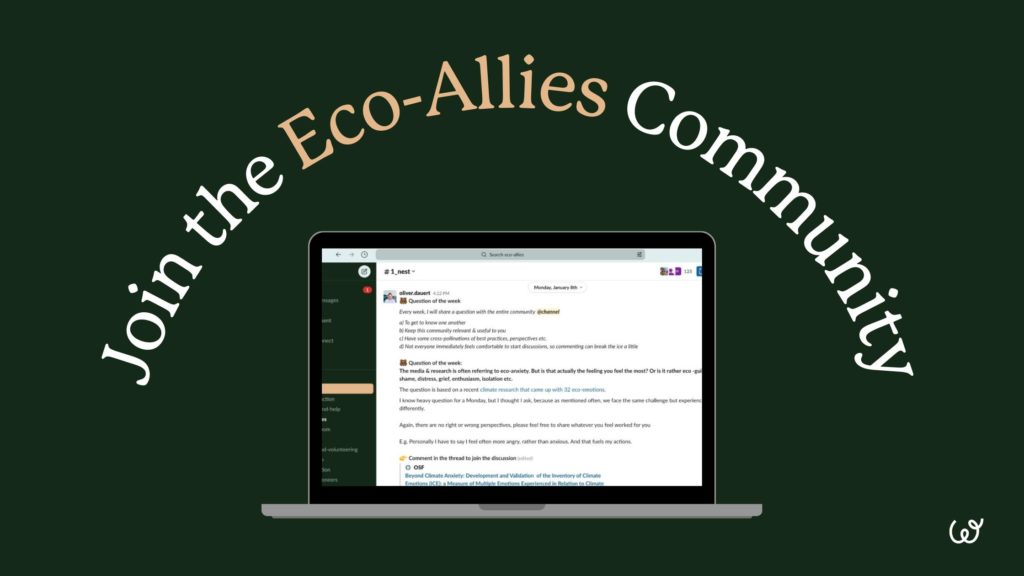Eco-anxiety symptoms can be hard to navigate, given the lack of research available in the mental health space right now. The lack of psychological support can be frustrating, we know, but there’s still plenty of hope. Eco-anxiety, also referred to as climate anxiety, is a topic sensitive to many. It refers to the psychological distress or emotional response caused by the perceived or real effects of climate change.
Solastalgia, which is also referred to more broadly as climate anxiety, isn’t just another buzzword; it describes the feelings of helplessness, worry, depression, and stress born from environmental change. The heightened fear of climate change reflects a growing awareness of environmental challenges that affect our planet and future generations.
Unfortunately, this isn’t folklore – it’s an overwhelming reality for many.
If this sounds all too familiar, you’re in luck (this may be far from what you’re feeling right now, but have trust in us). Below, we look at the symptoms of climate anxiety, address your fears, and support mental fitness with our top actions to soothe climate-induced stress. Whilst it may not be the cure you’re looking for, action starts with awareness. Dive in!
What are the symptoms of eco-anxiety?

1. Lack of focus
Feel like your brain has been in a foggy forest recently? Well, you’re not alone! Climate anxiety makes it challenging to focus on tasks that require your full attention and engage in everyday activities.
The science? When your thoughts are preoccupied with exhaustive thoughts about climate change, your cognitive resources deplete. Trust us, we get it. Who has time to focus on spreadsheets when glaciers are melting? This lack of focus can impact productivity, as well as contribute to feelings of frustration or inadequacy in your personal and professional environments.
2. Demotivation
Are you struggling to muster the energy to make positive change? Feelings of demotivation are common amongst those experiencing climate anxiety. The overwhelming nature of environmental issues can cause information paralysis and distract us from focusing on what really matters.
Feeling demotivated is something we all experience from time to time and can be a frustrating feeling for most. Understanding the underlying causes of demotivation, combined with implementing ways to boost our motivation, can have a significant positive impact on transforming your eco-anxiety. Remember, it’s a marathon, not a sprint – start by introducing small, impactful habits into your day and building them up over time. Want to get out in nature more? Walk for 5 minutes today, then 10 minutes tomorrow. You’ll have reached an hour before you know it!
3. Chronic worry
People with climate anxiety may find themselves constantly thinking about the consequences of climate change, its impact on their lives, and the effects on our home. An ‘impending doom,’ so to speak.
You may feel like you’re treading water in a sea of uncertainty, unable to find solid ground amidst the waves of anxiety. These worries can be a result of extreme weather events, loss of biodiversity, and the long-term viability of ecosystems.
4. Sleeping disorders
Many may find that persistently worrying about the future of our planet leaves little time for catching up on beauty sleep. The stress associated with eco-anxiety can trigger a psychological response in the body that impacts cortisol levels. This arousal shows to interfere with the body’s natural sleep-wake cycle and can impact all areas of sleep, such as difficulty falling asleep, frequent awakenings during the night, or restless sleep.
5. Feeling of helplessness
It is not uncommon for individuals with eco-anxiety to be overwhelmed by the magnitude of environmental issues. This can often breed feelings of helplessness and lack of power against the battle humanity faces with climate change.
With the weight of the world’s problems feeling like a sack of bricks on your shoulders, it’s easy to feel like a small fish lost in a large pond. Remember, it’s not a 1v1 battle between you and climate change – it’s a team effort!
6. Eco-grief
Welcome, eco-grief: a stormy cloud looming in the sky, casting a shadow on a sunny day. It refers to the feelings of mourning and loss associated with environmental degradation and the impacts of climate change. It’s the ache we feel when we see the extinction of our favourite species or the devastation to communities caused by wildfires and floods.
It’s natural for people to experience eco-grief as they witness the loss of biodiversity and frequent natural disasters, this feeling is what makes you human. Imagine the kind of world we would be living in if people didn’t care for our planet?
7. Eco-guilt
Eco-guilt, like an annoying task, sucks the life out of us when we believe we’re not doing enough to protect the environment – the nagging voice in our heads that judges our every move. It’s like accidentally stepping on a snail or forgetting to compost your banana peel.
Those with climate anxiety may experience feelings of guilt and self-blame as a result of their contributions to climate change. This includes transportation habits, dietary choices, and consumption patterns.
8. Depression
As worries about climate change take root in the form of eco-anxiety, it can sap your energy. The constant barrage of negative news about the state of our planet can weigh on your mind like a heavy fog. It obscures your vision and makes it hard to see the beauty that still surrounds you.
When eco-anxiety blinkers reality, it can often be hard to see the light at the end of the tunnel. Human anatomy is intertwined with nature, so when a wave of sadness hits, remember that as a tree needs sunlight and water to thrive, our minds need nurturing to stay healthy.
9. Isolation
Some individuals may cope with climate anxiety by living an avoidant lifestyle, one you may be familiar with. Turning off the news and avoiding conversations related to climate change can further exacerbate feelings of isolation or distress. Whilst avoidant behaviours provide short-term relief from the reality of climate change, willful ignorance can cause snowballing consequences.
On the other hand, challenging societal norms by inheriting sustainable lifestyle changes can isolate those who don’t conform to the status quo. Choosing your battles can be hard, and consequently harder, with societal pressures that can drastically elevate feelings of eco-anxiety.
10. Panic attacks
Let’s break it down: anxiety is a feeling of stress, panic, or fear that can significantly impact your daily life both physically and psychologically. It can manifest itself in various forms, climate-anxiety included.
Eco-anxiety can trigger panic attacks that cause physical reactions like breathlessness, a racing heart, chest pains, shaking, and sweating. A panic attack induced by eco-anxiety is a bodily response to a threat or danger – whether it’s perceived or real. They are often prompted by anxious feelings associated with the uncertainty of environmental change.
11. Anger
The constant volley of negative news and reports can feel like a relentless downpour that washes away your sense of peace and leaves behind a mess of emotions. Witnessing the destruction and exploitation of natural resources can evoke feelings of anger towards those responsible.
This sense of injustice, often fueled by corporations or governments prioritising profit over environmental protection, can incite anger at those contributing to the problem. While anger can be a natural response to eco-anxiety, it’s essential to recognise and manage these emotions constructively.
Who is most likely to develop symptoms of climate anxiety?
Eco-anxiety remains a relatively under-discussed topic in the public space. However, statistics highlight its prevalence among the general population.
Younger generations tend to show more symptoms of eco-anxiety
More than half of young people worldwide have shared that they are extremely worried about climate change. Growing up with exposure to a variety of media outlets, they cannot hide from the effects and constant news, enhancing their vulnerability to eco-anxiety.
Let’s break it down further: 67% of Gen Z are anxious about climate change, and 63% of millennials feel concerned about the environmental crisis. These generations will have to live through the current environmental destruction that is outpacing nature restoration. This certainly feels like a slap in the face.
Women experience more fear of climate change than men

8 out of every 10 women ( 79%) expressed being concerned about climate change. This sits higher than the percentage of men who reported similar levels of concern, which currently stands at 72%.
While notable differences have been observed, this study suggests that the gender gap may not be as pronounced as commonly assumed. In public discussions, there’s a prevailing stereotype that only women are deeply invested in climate and environmental issues. However, the findings of this research challenge that notion, sensing an equal share of fear across genders.
Indigenous people are more likely to experience eco-anxiety
It’s worth mentioning that climate anxiety might be more common among Indigenous communities as they reside in areas prone to environmental threats and rely on nature for their way of life. Sadly, the loss of their cultural and spiritual ties to the natural world only adds to their distress.
Moreover, individuals who have a strong affinity for nature, either due to personal beliefs or cultural background, are also more susceptible to experiencing eco-anxiety. Whether it’s a deep-rooted connection to the environment or a genuine concern for ecological issues, those who feel intimately linked to nature may find themselves more vulnerable to eco-anxiety symptoms.
Everyone who understands what is at stake
Don’t be fooled by the misconception that eco-anxiety is a rich people’s problem – it is not a matter of income. In our recent study, 42% of the middle and upper class reported fear about climate change compared to 39% of the working class.
Research shows that climate anxiety is not limited to specific demographics such as the youth, affluent, or women; rather, it affects us all. Naturalists and climate scientists also suffer from eco-anxiety due to their knowledge and emotional ties with the natural world. After all, when you’re aware of what’s at stake for our planet, it’s hard not to feel the weight of the world on your shoulders.
How to deal with the fear of climate change and soothe the symptoms?
Welcome those feelings
Emotions aroused from anxiety about the future of our planet can be overwhelming and uncomfortable but don’t need ‘fixing’. Instead of trying to force your feelings about climate change into submission, invite in the range of emotions. Experiencing these feelings can motivate you to act and give you a purpose in life.
Each time we consciously act against our angst, we disrupt the self-fulfilling prophecy of powerlessness. Think about it like this: if we feel powerless, why would we act? But if we believe we possess power, why wouldn’t we act?
Surround yourself with people who care

Reach out and share your eco-anxiety with your tribe! Sharing your feelings with those who understand can make you feel heard and bring a warm sense of support that can ease eco-anxiety symptoms.
Wildya is on a mission to help you transform eco-anxiety into action. So, we created a safe space for our movement. Eco-Alhttps://herd.wildya.earth/join?invitation_token=05c0a8f9553a95a81732447ff5074498e641796e-ce117549-3d09-49bc-b280-b5a2f6a9b583lies is a global community that welcomes anyone who struggles with eco-anxiety to rejoice in support, community, and positive climate action.
Try ecotherapy
Ecotherapy is a formal type of therapeutic treatment that’s like a breath of fresh air for the soul. It involves doing outdoor activities in nature, such as:
- Working in nature: Roll up your sleeves and get your hands dirty with some conservation projects, gardening, or rewilding.
- Experiencing nature: Breathe in the fresh air, soak in the scenery, and let nature work its magic. It’s like a nature-made tonic for the mind and body!
- Spending time with others in nature: Whether you’re cooking up a storm over a campfire or picnicking in a scenic spot, sharing quality time in nature can deepen relationships and foster a sense of community.
Turn your eco-anxiety into action
Being involved in nature-friendly initiatives will not only make a positive impact on the planet but also work to ease feelings of guilt and anger that manifest from eco-anxiety.
Not sure how? The Wildya community is the answer you’re looking for. Start by investing a small amount of time each day through nature-based learning and create a big impact. It’s simple: instead of theory, we focus on action. We provide you with courses that tackle all of these symptoms and daily actions to ensure you take your life back.
Limited experimentation on the symptoms of climate anxiety leaves many individuals wondering how to comprehend the complex array of feelings, emotions, and symptoms induced by climate change. The crucial insight lies in taking proactive steps to address both environmental issues and your mental health.
As our world experiences environmental change, resilience, and adaptability is key! Join hands in nature-based initiatives aimed at mitigating climate change to help combat eco-anxiety symptoms. Embrace the support of like-minded individuals to develop skills that help you gain perspective, cope with stress, and enhance mental fitness.
Ready to nurture your personal growth whilst caring for the planet? Join our community and test it yourself to curb your eco-anxiety and make positive changes through nature-inspired learning!


